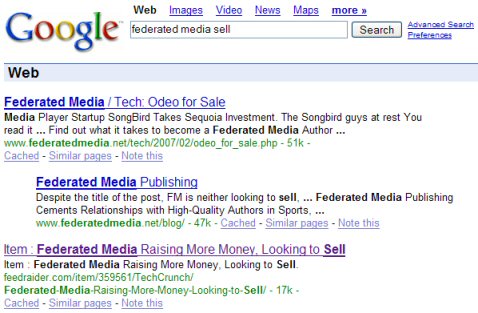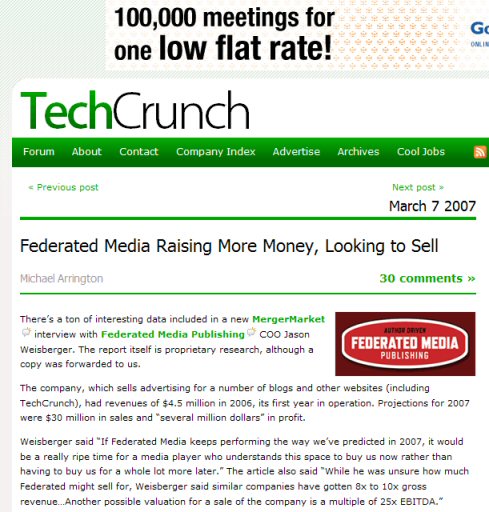Do Online Publishers Do Enough To Correct Inaccuracies?
In traditional newspaper publishing, errors are typically corrected the next day, in small print, in a small section inside the paper that lists such errors. Most bloggers have adopted the convention of the “update,” with has many similarities to the print publisher approach. An update is typically an addendum placed at the end of the original post that lists any new information, including corrections. But the original post, including the title, typically remains unchanged.
In an online world driven by search engines that create permanent — and easy to find — records of every inaccuracy, is this practice sufficient?
This week, Mike Arrington at TechCrunch wrote a post titled, “Federated Media Raising More Money, Looking To Sell,” which cited information from a proprietary research report and featured the following quote from Federated Media COO Jason Weisberger:
If Federated Media keeps performing the way we’ve predicted in 2007, it would be a really ripe time for a media player who understands this space to buy us now rather than having to buy us for a whole lot more later.
The post also included this statement: “The company is also considering a number of acquisitions, and raising a new round of financing of $3 – 8 million to pay for them.”
The post was featured on TechMeme and attracted a lot of attention, as many TechCrunch posts do. But then John Battelle, founder of Federated Media, posted the following on the FM blog:
A post on TechCrunch tonight picks up on some private research that discusses any number of details about FM and its purported plans. Despite the title of the post, FM is neither looking to sell, nor do we need financing. Sure, any startup has its price, but ours is dictated by a very important caveat – anyone who is looking to purchase FM must first look to our business model, and determine if it wants to take care of the most important asset we have – our relationship with our publishers. Just to be clear, here at FM we are not focused on selling our business, or even raising money (we don’t need any at the moment). What we are focused on is adding value to our publisher’s business. That’s it.
Mike Arrington added the following “update” to his original post:
Update: I spoke to John Battelle, who says that this interview was done under the impression that it would be used as background material only, and that they have no intention of selling the company in the near future. He also said that the company is not actively fundraising at this time.
This kind of update is generally accepted by the online community to be sufficient. But I wonder if it is. And I pose this question notwithstanding all of the posts, on a wide range of sites, where inaccuracies are not corrected at all.
If you Google “Federated Media sell,” here’s what you get:

If you follow the path to the TechCrunch post and don’t look below the fold (at least on my laptop screen), here’s what you see:

If you go back and read TechMeme for March 8, 2007, you’ll see the following:

My point here is that inaccuracies have a way of persisting on the web even when the standard “update” convention is employed. Of course, anyone putting in any reasonable effort to figure out whether Federated Media is indeed for sale will discover easily enough that the information, according to John Battelle, was inaccurate. But the web does a better job of highlighting the inaccuracy than the correction.
So should Arrington have done more? Should he have changed the title of the post? Should he have put the update on top? What if Federated Media IS for sale and Battelle just denied it after it went public? Of course, the original information was based on the statements of a company executive, so a statement from the company’s most senior executive should presumably be taken as more definitive. But what if Arrington felt that reporting Battelle’s denial was sufficient, and that it didn’t rise to the level of a larger correction?
Lot’s of sticky questions. And I don’t claim to have the answers. What I do know is that bloggers, as well as anyone who posts anything anywhere online, need to realize that they are acting as online publishers, whether they recognize it or not. And with any type of publishing comes responsibilities and liabilities that should not be taken lightly.


Use the technology: Post a separate correction, and insert a parenthetical correction in the original, and now incorrect, item.
When discussing truth and accuracy, the standard shouldn’t be the limitations imposed by technology used by other media can do, but what bloggers can do.
Probably not perfect, but the best I know of (because I helped implement) is at CNET News.com. Try http://corrections.news.com/
John Roberts
formerly CNET, now OpenDNS
Well, what counts as inaccurate? “Federated Media Raising More Money, Looking to Sell” may have been true at some point. Or even if not true, may have been some writer’s best guess at some point. This is as much a fact as the fact that Federated Media wasn’t raining money, etc.
The online record is what it is. Determinations of truth or falsity are *separate* events, subsequent to the original posting. In my case, I let things stand. If a correction is warranted, someone will posted it in the comments.